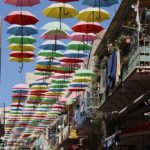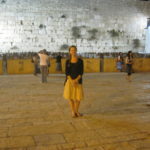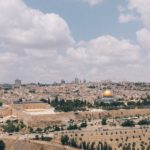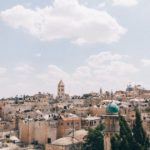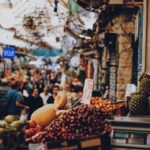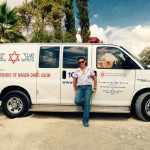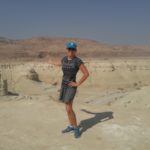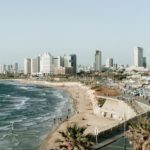Jerusalem in a Time of Terror

When you live in Israel, “terror” is a way of life. You keep your eyes and ears open, and you always know where the nearest escape route is. It’s almost an instinct. But what you don’t do is worry about all this. You get on with your life and your activities. I know I certainly don’t want to live in fear.
Three days before my daughter came to visit, my phone pinged that there had been an attack in Jerusalem. I’m in Tel Aviv, so it took me awhile to get to it. I was busy cleaning and washing and planning for Freha’s visit. We wouldn’t be heading for Jerusalem for five days. By then things should have settled down.
What happened? Just after 7 a.m., three gunmen ran out of the Temple Mount, former home to the Jewish Temple, current home to al-Aqsa Mosque. Armed with guns, they shot at Israeli Border Police officers stationed near the Lions’ Gate. Police shot their assailants. Two police officers and the three attackers died.
My other cousin laughed in her face. “Nobody’s been murdered in the Jewish Quarter since 1967. How special do you think Francha is that she’ll be the first?”
Such an attack and return fire would not be unusual except for the fact that the attackers used weapons hidden in the mosque. Israel shut down the mosque immediately and found even more deadly weapons inside. The mosque is under the control of Muslims, and guarantees the holy place will not be used for weapons. For this reason, Muslims can go freely in and out of al-Aqsa, while all others must pass through metal detectors.
Immediately, the Grand Mufti of Jerusalem urged Muslims to march to al-Aqsa and hold Friday prayers wherever Israeli police stopped them. I didn’t pay much attention at the time, even though Freha and I were planning to stay at an Air B&B in old Jerusalem the following week.
A cousin, older than I am, was already worried though. For several weeks, she had been begging me not to stay in the old city. It was dangerous, she said. Especially the Jewish Quarter. I’d get murdered. My other cousin laughed in her face. “Nobody’s been murdered in the Jewish Quarter since 1967. How special do you think Francha is that she’ll be the first?”
So Freha came and we headed for the beach and the shopping malls and Tel Aviv’s vibrant cafe scene. We dropped into bed each night, exhausted, surrendering to sleep without even looking at Facebook.
In the Armenian Quarter we drank strong coffee and the waiter offered me 10 camels and a donkey for my daughter. He gave up when I held out for 148 camels.
We didn’t know that in Jerusalem, authorities had shut down the Temple Mount complex, closed the old city to traffic, raided al-Aqsa Mosque, and questioned leaders of the gun-men’s group. They closed the old city to traffic and there were no Friday prayers at the mosque for the first time in years. Two days later, Israeli authorities reopened al-Aqsa, but to increasing angry crowds of Muslims. In response, Israeli authorities installed cameras in the area and beefed up security with more officers.
On July 17, Fatah called for the next day to be a “day of rage.” Beginning July 18, Palestinians clashed with Israeli security forces outside the gates of al-Aqsa. There were more attacks and murders around the country, some deaths Palestinian, some Jewish. A few days later, Palestinian President Mahmoud Abbas suspended all official contact with Israel until the metal detectors were gone.
Amid this drama, Freha and I slipped into the old city via the Jaffa Gate, headed for the Armenian Quarter, and turned off into narrow alley toward the Jewish Quarter. Where all was quiet. Our guide took us on a tour, and we headed for the stone patio overlooking the Western Wall and the Temple Mount, where I expected to see platoons of police and soldiers. Nothing. No protests that we could see. No gunfire. No chanting. No yelling. We headed for a recommended shwarma restaurant and ate at a covered patio. On the way back to our B&B, we stopped at a convenience store for a forgotten toothbrush and at the main square of the Jewish Quarter on our way home for a peaceful sleep.
It was there that disaster struck… Suddenly I was on the ground, staring up into the shocked faces of hoards of people. Shot? Stabbed?
The next day, we joined our group for a tour of the old city’s four quarters. We waited outside the Flower Gate, just outside the Muslim Quarter. Amid security gates, the city awoke to the smells of fresh baked bread and strong coffee and the sight of security gates and heavily armed police. Our Arab Israeli guide met us and we all headed for the Damascus Gate area for the best bread in Israel. Then it was off to the Indian Council for a look over the whole old city, and to the Armenian where we drank strong coffee and the waiter offered me 10 camels and a donkey for my daughter. He gave up when I held out for 148 camels, what the online camel calculator said should be her going rate.
In the Christian Quarter, we followed the Way of the Cross and, of course, stopped for food–this time, three kinds of hummus. Throughout this part of our tour, we saw Israeli police everywhere, and some areas we would like to have seen were closed off, with only Muslims being let in. By the time we got to the Jewish Quarter, there was no room left in our stomachs for any more food stops. We saw a compound with four different synagogues, but everyone had already seen the more famous Western Wall, so we headed back to the Muslim quarter for shopping!
Bad things can happen. Really bad things. But at heart people are good and generous and caring. Sore backs and big bumps on the head heal.
It was there that disaster struck. It was close to noon, and the narrow streets were packed with shopper and tourists and residents. Shopkeepers pulling carts full of merchandise forced mere pedestrians to flatten against walls to let them through, their wheels rolling down double ramps on each stair step. The motorized garbage truck forced its way through the same way, followed by hoards of people crowding back into the street in their wake. And suddenly I was on the ground, staring up into the shocked faces of those hoards. Shot? Stabbed?
Nothing so dramatic. A standard fall. I do it all the time, in countries all over the world. And with those narrow steps punctuated with ramps, it was bound to happen. Tourists in shorts, veiled Muslim women, sweating shopkeepers, and an increasing number of Israeli police surrounded me. They were on their way to al-Aqsa, but they stopped. “I’m not hurt,” I told them. “Seriously. I just need time to catch my breath. I can get up by my self when I’m ready. You have important things to do.” They believed me, and leaving bottled water behind with Freha, they marched on. Moments later, I was on my feet, pulled up by a dozen pair of hands. Hands of people who might be angry about or ignorant of the situation on the Temple Mount and the rising tensions around Israel.
That confirmed for me why I don’t live in fear. Bad things can happen. Really bad things. But at heart people are good and generous and caring. Sore backs and big bumps on the head heal. Freha returned to America. The metal detectors outside el-Aqsa are gone. Friday prayers are back to normal. I’m home, walking again without a cane and focusing on the gift of life and travel in Israel.
Photo by Pixabay.

